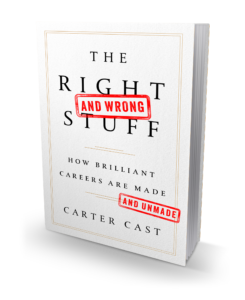The Right and Wrong Stuff
Most people don’t realize how easy it is to derail a career or to lose a job. Adding to the problem is that it is possible that your career has stalled without your knowledge, an unexpected plateau because of something you don’t know about. Maybe it’s because you’ve been labeled impulsive or not seen as a team player.
Whatever the reason, it’s important to pause and assess where you are so you can get back on track.
Carter Cast knows this firsthand. In a terrific new book, The Right and Wrong Stuff: How Brilliant Careers Are Made and Unmade, Carter sheds light on what causes careers to derail and others to soar. His advice is practical and actionable. Carter is a professor at Northwestern’s Kellogg School of Management, a former CEO, and a venture capitalist. I recently asked him to share some of his perspective.
Would you share your own story of career derailment?
Back when Bill Clinton was president and I was a marketing manager within PepsiCo’s Frito Lay division, I found myself sitting in my boss Mike’s office for my annual performance review. I worried as he started the preamble, which was along the lines of, “This is going to hurt me more than it hurts you.” Mike didn’t bury the lead for long—soon he came right out and told me that senior management considered me unpromotable, which meant I was no longer on the fast track at Frito-Lay. He laid out a list of my offenses, littering his examples with words like “uncooperative,” “resistant to feedback from authority figures,” and “unmanageable.” He described my behavior in various situations, repeatedly pointing out times I circumnavigated the established processes and procedures and ignored the chain of command for the sake of expediency, or the times I quietly ignored his feedback and chose to do things my own way.
Thirty painful minutes later, as he was wrapping up, when Mike asked if I had anything to say for myself, I simply asked if I was being fired. (It sure felt like it.) He said, “No, but I don’t want you to work in my group any longer. You’ll need to look for another marketing position within the company.”
Eventually I found another boss and team to work with, but it was a humbling experience because as I talked to prospective bosses, I learned that I had a reputation problem. I was considered “difficult to manage.” I realized I lacked the self-awareness needed to change my behavior right away, so I went about doing so. I identified the circumstances that triggered my disruptive behavior (e.g. sitting in ponderous process meetings; being managed tightly by a very “participative” boss; being talked at by a verbose senior manager), and I steadily began to develop practical methods to better self-regulate and curb my tendency toward stupid, unnecessary insubordination. Over time, I was again considered to be a promotable employee, but it took a couple years to climb out of hole I’d dug for myself.
Use Negative Feedback to Propel You Forward
Your story highlights negative feedback, and I was intrigued that you actually called your boss and had him give it to you again! How do you coach individuals to hear negative feedback and use it in the best way possible?
I must be a glutton for punishment. (I was a swimmer, so I’m fairly certain.) Yes, twenty years later, I called my old boss Mike to get some quotes for the book. And he gave them to me. Yikes. Even after all these years, when he spoke to me, about me circa 1995, I felt a wave of queasiness! Thirty-three year old Carter needed some tough love.
Anyway, when you’re coaching people, a good way to preface a tough conversation is to let them know there’s “gold in the dark” – that we all have areas of vulnerability, and it’s the people who embrace them – who look for the gold in the dark – that improve and get ahead. In my experience, people are also more receptive to hearing negative feedback if it’s not the only kind of feedback you deliver. If you provide them with feedback on an ongoing basis – not just the negative, but also positive feedback and developmental feedback to help them improve in an area they may have a skill gap, they’re more likely to be receptive to criticism because they know you give balanced feedback and care about their career development.
Can you give me one statistic in particular that surprised you when conducting research for the book?
Here’s one nugget that really surprised me: people who overstate their abilities in 360-degree assessments are 6.2 times more likely to derail than those with accurate self-awareness. That’s a staggering number! I learned that it all starts with having a decent level of self-awareness. What am I good at? What do I stink at? In what areas do I need to self-monitor – practice self-regulation?
What’s the danger of only focusing on strengths?
I think the “strengths movement,” popularized by books such as Now, Discover Your Strengths and StrengthsFinder 2.0, is a positive development. What’s not to like about a philosophy that focuses on our upside—one based on the premise that we’re happier and perform better when we understand what we’re good at and put ourselves into jobs that leverage those strengths? The problem comes when it’s taken too far and is used to the exclusion of other methods of self-examination and career development.
Two problems surface when companies focus excessively on the positive. First, not all strengths are of equal importance. What you’re good at might not be what your firm needs you to be good at. The value placed on particular strengths often depends on the job context; the strengths needed usually vary by industry type, by job function, and by firm size and stage of development. You may have a set of skills or several strong behavioral traits that just aren’t of primary importance for your company at a particular point in time. For example, you may be an empathetic person with excellent account management skills but that may not be of primary importance if you’re at an early-stage venture that needs you to have outstanding selling skills to bring in new accounts.
 Second and more damaging is that the overreliance on “focusing on your strengths” can mask a critical skill gap or a personal blind spot that can stop a talented person’s career in its tracks. Derailment research shows that careers stall more from having the “wrong stuff” (e.g., being insensitive to others) than lacking the “right stuff” (e.g., not having strong analytical skills). Competency assessments are widely used to gauge positive personal traits such as mental horsepower, emotional intelligence, and decisiveness as well as job skills, such as technical knowledge. The problem is, these assessments gauge the “right stuff” but do not examine the “wrong stuff,” areas where people are vulnerable to derailment. The reason boils down to a preference for focusing on the positive—competency development—and not addressing the negative—fixing issues that may lead to derailment. But without having these necessary hard conversations, people suffer because they’re left unaware of a blind spot or area of vulnerability instead of being able to develop a plan to resolve or mitigate it. As a result, people are not receiving the personal feedback they need to improve, and their careers are suffering. In this age of the gig economy and the 1099 worker, employees are not receiving the training or feedback they need to take corrective actions around areas of personal areas of vulnerability.
Second and more damaging is that the overreliance on “focusing on your strengths” can mask a critical skill gap or a personal blind spot that can stop a talented person’s career in its tracks. Derailment research shows that careers stall more from having the “wrong stuff” (e.g., being insensitive to others) than lacking the “right stuff” (e.g., not having strong analytical skills). Competency assessments are widely used to gauge positive personal traits such as mental horsepower, emotional intelligence, and decisiveness as well as job skills, such as technical knowledge. The problem is, these assessments gauge the “right stuff” but do not examine the “wrong stuff,” areas where people are vulnerable to derailment. The reason boils down to a preference for focusing on the positive—competency development—and not addressing the negative—fixing issues that may lead to derailment. But without having these necessary hard conversations, people suffer because they’re left unaware of a blind spot or area of vulnerability instead of being able to develop a plan to resolve or mitigate it. As a result, people are not receiving the personal feedback they need to improve, and their careers are suffering. In this age of the gig economy and the 1099 worker, employees are not receiving the training or feedback they need to take corrective actions around areas of personal areas of vulnerability.
What percentage of us are at risk of having our careers go off the rails?
The statistics of career derailment are sobering. I don’t think most people realize that this is not a niche topic. Studies show that as many of 67% of today’s managers and leaders, from the c-suite to middle management, will be fired, demoted, or simply plateau below their expected level of achievement. This statistic is just one of many about career derailment that started me on a path to find out why so many talented people were going off track.
The Importance of Empathy
What is the most common attitude that causes career derailment?
Having a lack of empathy for others causes a lot of career trouble. These people are unable to keep their egos in check and lack the listening skills to hear and respond to useful feedback. As a result, they won’t improve. Eventually, they will flame out, because people won’t want to work with them and won’t want to follow them.
Would you share just one of the archetypes?
One executive I interviewed was an ego-driven Captain Fantastic – a guy with “sharp elbows” that bruised others on his quest for the corner office. An engaging, smart and bold management consultant, he had a tremendous ability to bring in new clients. As a result, he was quickly promoted to become the youngest managing director in his firm and was put in charge of a large region. However, this role required him to spend a meaningful amount of time on administrative matters such as budget management, resource allocation, and employee training and development. But he didn’t like the administrative part of his job and was quite dismissive of the staff who helped him. Over a period of a year, this Captain Fantastic had alienated people to the point where most moved off his team. Senior leaders realized that he was not the right person for the new job, but they loved his ability to generate revenue. So they moved him to a business development role, which was a soft demotion, and he knew it.
So self-awareness is the key to ensuring you don’t derail?
Yes – it’s the critical starting point. Recent research has shown that only 10-15% of us have a decent level of self-awareness. That’s astoundingly low.
All of us have at least a trace of a derailment tendency. We all have some vulnerability we need to address, or some area we need to self-monitor. Are you aware of yours? As I’ve written above, I wasn’t aware of mine! To try to help people, I developed an assessment with the help of the Center for Creative Leadership to assist people in identifying the behaviors or tendencies to be particularly aware of. Even those who are promoted and continue to progress in their careers have derailment propensities they should watch closely. Having a derailment propensity is not an indictment; it’s just something to be aware of, and to be managed. The key is holding a mirror up to ourselves to see our blind spots, or to have someone else (e.g., a coach) help us recognize and work on these issues. With greater self-understanding, we can acknowledge our propensity toward certain derailers and actively work to develop compensatory strategies. We can make a commitment to learning how to become more effective and mitigate the likelihood of a derailer impeding our career progress.
As a wise executive coach told me, “We need to all stop blaming, and start claiming our derailers. By doing so, we can mitigate their impact on our careers.”
In your book, you don’t just talk about derailment, you also talk about high performers with “the right stuff.” What constitutes having “the right stuff?”

This was a really interesting part of my research. I found, by examining 360 feedback data, that high potential, high performers with the “right stuff” aren’t good at everything – they’re flawed like everyone else. For example, of the, say, ten competencies that a particular company tracks, people with “the right stuff” may be lousy at two of them, average at five, but very good at the three competencies that really matter. The three competences that matter – that encompass having “the right stuff” are:
- Learning agility: These people develop themselves – they are curious, open-minded and are self-starters who take the initiative in their own careers.
- Relationship-oriented: They listen well, ask good questions and seek to understand the perspective of others. By doing so they build strong relationships with their co-workers and are able to enlist them to their cause.
- Drive for results: They are tenacious and pursue projects to completion, and they take personal accountability for their team’s joint outcomes. They don’t hope someone else picks up the slack. They pick it up themselves. They see what needs to be done and they do it.
For more information, see The Right and Wrong Stuff: How Brilliant Careers Are Made and Unmade.

